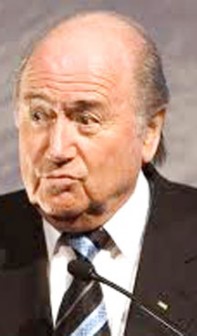ZURICH, (Reuters) – The long and tortuous road to the 2022 soccer World Cup in Qatar took another twist yesterday when FIFA delayed making a decision on whether to play the tournament in the winter.
Instead, FIFA, also grappling with allegations of maltreatment of migrant construction workers in the country, set up a consultation process to decide when the tournament should be held.
It will reach a conclusion sometime after the 2014 World Cup in Brazil, whose own chaotic preparations have been shunted out of the limelight by Qatar, and by 2015 at the latest, FIFA president Sepp Blatter said.
The announcement came nearly three years after Qatar was originally awarded the tournament and Blatter admitted he took too long to appreciate the problems posed by the country’s scorching desert summer.
However, he warned that soccer’s governing body could face “liabilities” if it moved away from the usual June-July slot.
“This issue will be an outcome of the discussions and consultations and then we will see what will be the consequences of liabilities or for leagues and other organisations if we played the finals in winter,” he said.
Australia, one of the four other countries who bid to stage the event alongside the United States, Japan and South Korea, has already said they could seek compensation if the tournament is moved away from the northern-hemisphere summer.
U.S. broadcaster Fox has said it assumed the tournament would be held in its regular June-July slot when it outbid rival ESPN for the television rights. FIFA secretary general Jerome Valcke had previously dismissed the idea that compensation could be paid.
Blatter, however, pointed out that FIFA had made it clear to all bidding countries that a summer World Cup had never been set in stone.

“The official FIFA documents given to all the bidders at the time stated that in principle… the competition will take place with 32 teams… and it is expected to be staged in June and July,” he said, repeating the phrase “in principle” for emphasis.
Europe’s powerful clubs have already indicated that they want to be involved in the consultation talks, which Blatter said would feature everyone who could be affected.
“The stakeholders include the players, the clubs, the leagues, the national federations, the confederations and FIFA, but it doesn’t only include sports,” he said.
“There are other partners, economic ones, be they from marketing, the media or television.
“We also need to bear in mind our obligations towards these partners, so we need to carry out very deep consultation and pay a great detail of attention and show some diplomacy and wisdom.”
AIR CONDITIONED
Blatter admitted FIFA could have acted more quickly. “We could have made this declaration that it is too hot earlier, I accept my responsibility that I could have said that earlier but we first have to deliver other competitions.” Qatar has insisted that a summer World Cup is viable thanks to cooling technologies it is developing for stadiums, training areas and fan zones but there is still widespread concern over the health of the players and visiting fans.
The country has also been hit in the last two weeks by allegations of ill-treatment of migrant workers.
A report in Britain’s Guardian newspaper said that dozens of Nepali workers had died during the summer and that labourers were not given sufficient food and water, were housed in cramped and unhygienic conditions and had their passports confiscated.
Blatter said it was not FIFA’s responsibility but they would not turn a blind eye.
“Throughout the world this is not FIFA’s remit, we cannot assume responsibility for the security of building sites in the world, but we’re not indifferent,” said Blatter. “We can’t say it doesn’t concern us.”
He said he would visit the Emir of Qatar to discuss the situation.
However, his response was quickly criticised as inadequate by the International Trade Union Confederation (ITUC), based in Brussels.
“FIFA has the power to make workers’ rights a condition of Qatar hosting the 2022 World Cup,” said ITUC general secretary Sharan Burrow in a statement. “There is still time to re-run the vote to choose a venue which respects workers.
“Scores of healthy young men are dying. This web of deadly practices draws in international companies, the Government of Qatar and FIFA.”
“The settlement of this global dispute is dependent on actions by FIFA and the political will of the Qatari authorities, which are still absent.”





